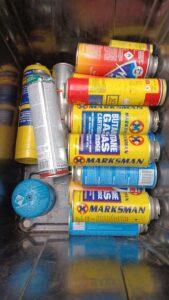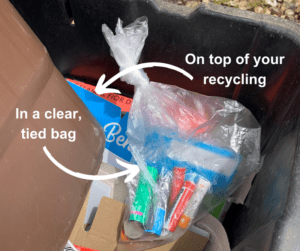Residents are being urged to help end a surge in dangerous fires caused by poorly sorted recycling and rubbish.
Fire services have joined Somerset Council and its collections contractor SUEZ Recycling and Recovery UK in asking for people to take more care or risk sparking dangerous and potentially deadly blazes.
In the last two years more than ten depot and truck fires are thought to have been caused by people putting batteries, gas cannisters or still warm disposable barbeques in their waste.
And the risk is on the rise – with three fires sparked in Somerset recycling depots in the last month.
In the last two weeks of May alone, vigilant crews have pulled more than 200 potentially explosive camping gas cannisters out of household recycling. But some inevitably sneak through to the sorting process.
Batteries and gas cannisters can ignite when crushed in the back of recycling trucks or as part of the sorting process in the Material Recovery Facilities at the Evercreech and Taunton depots.
Disposable barbeques put into refuse bins without being fully soaked and extinguished can retain heat, smoulder and cause fires in truck and when tipped back at the depot.
Fires cause damage and put lives at risk, and as the weather warms up Somerset Council and SUEZ Recycling and Recovery UK are calling on residents to please do the right thing with these potentially dangerous items.
What should you do?
- Small household batteries – can be recycled in weekly kerbside collections but must be put in a clear, tied plastic bag put on the top of the recycling box. They must not be left loose in recycling boxes, put in the Bright Blue Bag or in the rubbish bin.
- Large batteries, such as car batteries, cannot be recycled at the kerbside and should be taken to your local recycling site.
- Small household batteries and electricals can also be taken to recycling sites, always check with team on-site for the correct area to put these.
- Small gas canisters – like those used in camping stoves are not recyclable in kerbside collections and must not be put in the rubbish bin. They must be taken to your local household recycling site. Always check with team on-site for the correct area to put these.
- Disposable barbecues – should be fully immersed in water and left to cool completely before putting into your refuse bin.
For more information visit opens in a new windowSomerset Council’s safety pages.
Councillor Sarah Dyke, Somerset Council’s Lead Member for Environment and Climate Change, said: “We have a recycling record to be proud of and want our residents and crews to stay safe.
“The recent trend is alarming – any fire can be dangerous and even fatal, so we would urge everyone to take care and sort their waste carefully.”
Matthew Canning, Contract Manager for SUEZ Recycling and Recovery UK: “There are some items, such as batteries and gas cannisters, that can pose a fire hazard when not disposed of correctly.
“As we enter the warm summer months we are seeing an increase in fires on our trucks and at our sorting facilities – through the vigilance of our staff, all of these have been brought under control quickly but every fire poses a risk to our staff and the environment.
“Please help us keep our teams safe by following the council’s guidelines on how to dispose of items safely, particularly batteries, gas canisters, and BBQs.”
Carol Frances, Crew Manager, Community Safety and Prevention, Devon and Somerset Fire and Rescue Service said: “Simple actions do prevent fires.
“Help us to reduce unnecessary fires this summer by thinking about fire safety when recycling and enjoying the outdoors.
“Due to the number of fires started by household waste and incorrectly disposing materials, a few simple actions can help prevent fires. Never put batteries into the household waste.
“Always remove batteries from appliances before putting them in the recycling. Recycle your small gas canisters at your local recycling centre. Use instant BBQs responsibly – always stay with your barbecue
“Make sure you have a bucket of water or sand nearby to put the barbecue out properly. We recommend packing a picnic rather than an instant barbecue.”
Somerset’s waste and recycling collection crews make more than 350,000 collections a week. For more information about what happens to the recycling they collect, opens in a new windowcheck the Somerset Recycling Tracker on the opens in a new windowSomerset Council website



